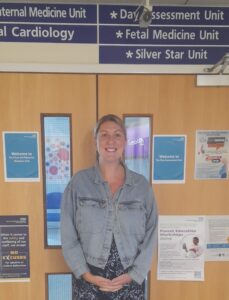
Doctors at Oxford University Hospitals are better prepared to identify those at increased risk of preterm birth following a special training session with 46 pregnant volunteers.
Eight doctors were given practical help to carry out an additional ultrasound scan to measure the length of the cervix in pregnant women at 20-34 weeks gestation. This initial session will be followed up with another at OUH in September. Similar training is planned at other hospitals in the region.
One of the volunteers was Hannah Stewart. She said: “I want to help other mums and babies by supporting training. I felt comfortable, informed and of course had the benefit of seeing baby!”
Another volunteer said: “I wanted to have a cervical scan because I have had two previous miscarriages. It was interesting to see if there was something that would indicate why this was happening. The scan was painless, quick and professional. I would definitely recommend the scan, especially as it was so quick and not as invasive as I thought it would be.”
One of the mums-to-be said: “I’m glad I was able to make a contribution towards improving healthcare for pregnant women. I hope this type of screening one day becomes a standard appointment for all women – it was hugely reassuring to see the results.”
Katy Hoare, Specialist Preterm Labour Midwife at OUH, said: “The pilot cervical scanning training day was extremely successful, with positive feedback from both the pregnant volunteers and the doctors learning this new skill. The eight doctors are now certified to perform these scans in practice, improving preterm birth prediction and prevention.”
All of the trainees who provided feedback said they would recommend the course to a colleague.
One of them was Dr Michael Shea, Subspeciality Trainee in Maternal Fetal Medicine at OUH. He said: “When the scans were straightforward, I could build my confidence in getting clear images. When they were more difficult, I could learn how to troubleshoot from experienced supervising consultants. I would now feel confident to scan (with indirect supervision) in a preterm birth clinic.”
This training and education programme is coordinated by the maternity and neonatal patient safety team at Health Innovation Oxford and Thames Valley (HIOTV). Eileen Dudley, Senior Programme Lead Patient Safety & Maternity/Neonatal Safety Improvement Programme Lead at HIOTV, said: “We are so grateful that so many pregnant women volunteered to help – they all left with a free scan image of their babies as a little thank you!
“This training will help towards better care for them, and for other mothers and babies. We’re now planning more of these sessions at NHS maternity units across our region.”

